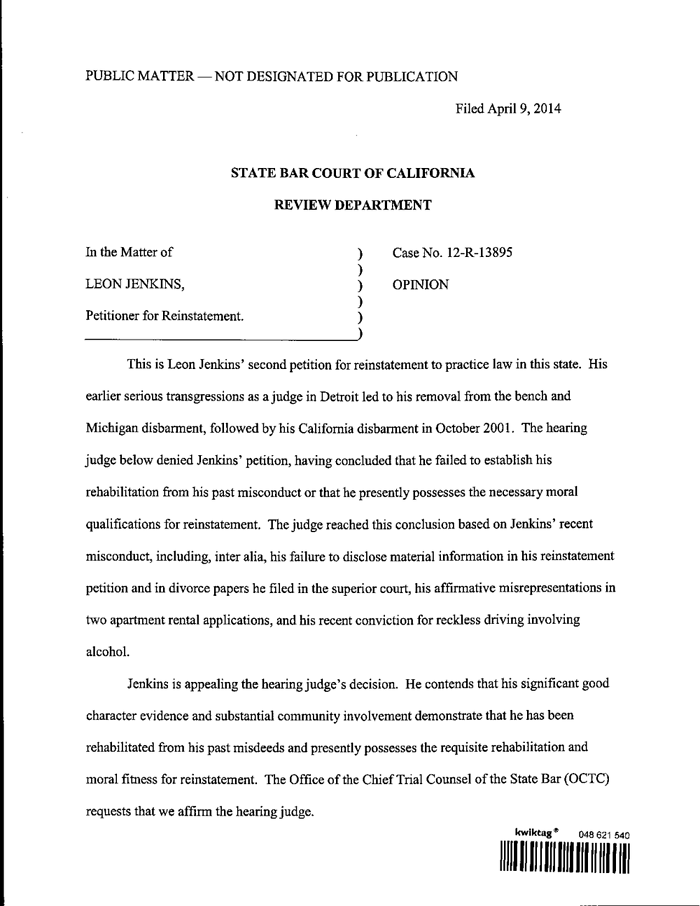
Amid the firestorm surrounding Los Angeles Clippers owner Donald Sterling's racist comments, little attention has been focused on the Los Angeles chapter of the National Association for the Advancement of Colored People, whose president, Leon Jenkins, is a defrocked judge who brought "dishonor" to the bench and has been banned from practicing law in two states.
The civil rights organization has given Sterling multiple laurels in recent years, including its Humanitarian Award in 2009 and its President's award in 2008. Until a tape recording was released containing Sterling's racist sentiments last week, the Los Angeles NAACP had been set to give him perhaps its most prestigious prize, the Lifetime Achievement award, at a ceremony on May 15.
Jenkins has refused to state how much money Sterling gave the group. Tax filings from Sterling's own charity, the Donald T. Sterling Foundation, show he gave $5,000 to the chapter in 2010, when he served on an honorary committee for the civil rights group's annual gala. A message left with Sterling's business office in Beverly Hills requesting information on total donations to the NAACP's Los Angeles chapter was not immediately returned.

A BuzzFeed review of the Los Angeles NAACP, one of 1,200 local units of the civil rights group nationwide, reveals a non-profit organization with little apparent public accountability and scant outside oversight. Basic tax records that are supposed to be filed and made public by all non-profits could not be found for the Los Angeles NAACP, making it impossible to know even basic information about the chapter's finances. The organization is run by Jenkins, a former Michigan state judge who was defrocked for taking bribes from the bench and bringing "grave dishonor" upon the judiciary. Jenkins was also barred from practicing law in Michigan and California. Just this month, California rebuffed his appeal to return to practicing law.
Jenkins, 60 years old, did not return calls, emails, and text messages seeking comment for this story. A message left at the Los Angeles chapter's number was not returned. Ron Hasson, president of the Beverly Hills/Hollywood chapter of the NAACP, referred questions about Jenkins to the organization's national office, noting that an email had gone out to all chapters asking they not talk to the press on any questions related to Sterling. A spokesman for the NAACP in Washington, D.C., did not answer specific questions about the Los Angeles Chapter.

According to Michigan and California records, Jenkins, a former district court judge in Detroit, was indicted in 1988 in federal court for bribery, racketeering, mail fraud, extortion, and conspiracy.
He was acquitted, but the Michigan Supreme Court removed him from the bench in 1991 based on evidence that he "systematically and routinely sold his office," including taking bribes to dismiss traffic tickets, accepting gifts from attorneys who appeared before him, and using his office to secure the release of a personal acquaintance without legal justification.
In addition, legal and state bar records show, he lied about his home address to secure lower auto insurance premiums, solicited an individual to commit perjury during a federal investigation of his conduct, and engaged in improper private conversations with counsel during the course of trials.
In 1994, he was disbarred in Michigan, meaning that he could not work as a lawyer. In 2001, he was disbarred in California, where he had been practicing law as a plaintiff's lawyer and civil rights attorney since 1991, because of his misconduct in Michigan.
Unable to practice law, Jenkins has engaged in a number of business ventures, including a financial services product called Freedom Card Inc. that was ultimately abandoned, according to federal trademark records. Since 2004, he has been the vice president of and a consultant to a restaurant, Smokehouse, owned by a personal friend, Leland Spencer, according to California State Bar records. He has also received income from Warehouse, a second restaurant owned by Spencer.
The general manager of Smokehouse restaurant in Burbank said that Spencer was out of town and could not be reached. Spencer did not immediately return an email.

Jenkins has sought reinstatement to the California bar on two occasions, 2006 and 2012. But both times he was rejected. Most recently, in a decision handed down April 9, two judges of the State Bar of California found that "Jenkins still has not established the requisite rehabilitation and moral fitness to resume the practice of law." They based that decision on evidence that Jenkins had repeatedly misrepresented his financial affairs, willfully failing to disclose an unpaid $25,000 loan from Spencer, understating his income, and concealing assets from his wife during divorce proceedings.
In addition, California state bar records show, Jenkins failed to disclose $660,000 he owed to former clients in a civil suit he handled, misrepresented his income on a rental application, and was convicted in 2008 for reckless driving involving alcohol.
Court records show Jenkins making $30,000 in 2009, and he described himself to the California bar "as a self-employed management consultant."
According to national NAACP spokesman Derek Turner, chapter presidents are volunteers who do not receive a salary. A review of public records does not reveal any properties owned by Jenkins, who appears to live in an apartment complex in Marina del Rey.
A graduate of Howard University and Wayne State University law school, Jenkins was elected to head the Los Angeles chapter of the NAACP in late 2008 and has twice been re-elected. His predecessor, Geraldine Washington, died in 2012.

NAACP bylaws allow local chapters to keep 75% of all money they raise through fundraising and membership drives, and also require them to make financial reports of "entertainment, contributions, and fundraising activities" available to the public.
No such documents could be found for the Los Angeles chapter, however. An Internal Revenue Service database of registered nonprofit organizations lists the chapter but has no information about its assets, revenues, or expenditures. No tax documents for the group could be located, and no names of other officers or executives at the chapter could be identified.
On Monday, Jenkins held a press conference disavowing Sterling's remarks and nixing the planned lifetime achievement award.
"The L.A. NAACP's intention to honor Mr. Sterling for a lifetime body of work must be withdrawn and the donation that he has given to the Los Angeles NAACP will be returned," Jenkins said at the press conference. "There is a personal, economic, and social price that Mr. Sterling must pay for his attempt to turn the clock back on race relations."
Still scheduled to be honored at the event with the Humanitarian Award, is Leland Spencer, owner of the restaurants that employ Jenkins and provider of the unpaid $25,000 loan mentioned in the California State Bar review.
If you have information about the Los Angeles NAACP, please email ken.bensinger@buzzfeed.com.
UPDATE: May 1, 10:05 a.m. PT: In an email, Spencer's wife, Marti, said that due to illness he would not be able to attend the May 15 NAACP event to pick up his Humanitarian Award.

